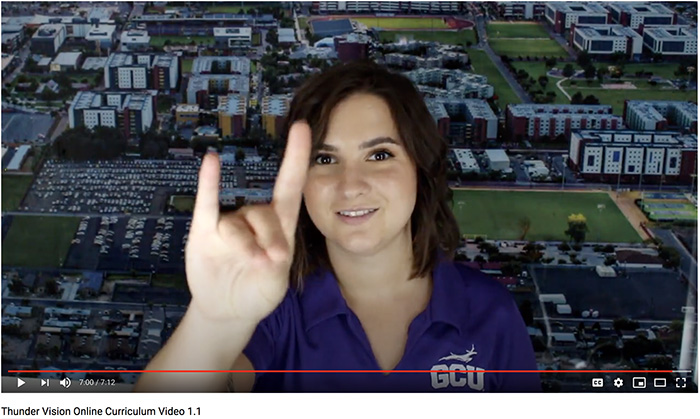
By Lana Sweeten-Shults
GCU News Bureau
Dreams don’t stop, even during a global pandemic.
It’s why Bethany Huffman refused to wallow and accept that one of her department’s signature programs, Thunder Vision, would just go the way of so many other big gatherings during the pandemic and come to a standstill.
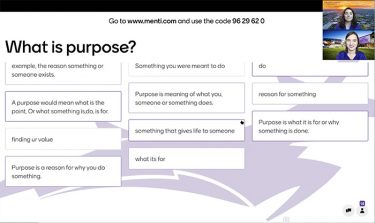
The K12 Educational Development Event Coordinator for Grand Canyon Education and the rest of her department insisted on finding a way for Thunder Vision to continue to work its magic.
The student-led Grand Canyon University program focuses on creating a culture of college-goers and helping school-age children’s dreams of going to a university become a possibility. Thunder Vision, more importantly, wants to reach young students, many of whom might never have thought of going to college before, and help nurture that vision.
In pre-COVID days, throngs of those students would visit GCU twice a week during the fall and spring semesters to listen to college-readiness presentations, tour the campus and break out into a dance party on the Quad lawn for a sack lunch with Thunder.
But these days, Thunder Vision has gone virtual.
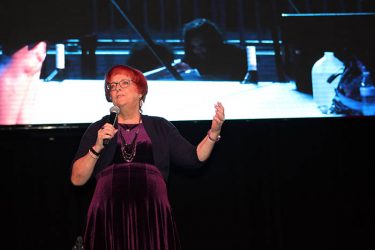
“As the summer approached and we realized that public health issues might preclude resuming Thunder Vision on campus in the new school year, we began to discuss how we could be creative and nimble and still offer opportunities for students to learn more about GCU and the college-going process,” said Dr. Jennifer Johnson, Director of K12 Educational Development.
The department think tank crunched those creative ideas and came up with a virtual model for seventh- and eighth-graders that it offered to pilot schools in mid-October. It since has opened its online version of Thunder Vision to all schools, whose faculty can choose from two options for students: a virtual field trip or an online college-readiness curriculum.
Those going the field trip route log onto a video meeting platform, such as Zoom, where Huffman speaks to students about getting ready for college. She also uses interactive presentation software called Mentimeter to connect with those students.
“They interact with me the entire time, so I’m able to give them polls," Huffman said. "I’m able to ask them various questions. We’ll see their answers, too, so even though I’m not able to ask them in person – I can’t even see their faces usually – but I am able to get that contact with them via Mentimeter.
“The kids have absolutely loved it.”
She also worked with campus tour guide Becky Heller, an ambassador in the Antelope Reception Center, to reproduce what GCU Live does, which is offer immersive, interactive video tours of the campus to remote visitors.
“She did it Thunder Vision style,” Huffman said, so seventh- and eighth-graders still get to see what they normally would see on an in-person Thunder Vision tour, complete with middle school-age facts.
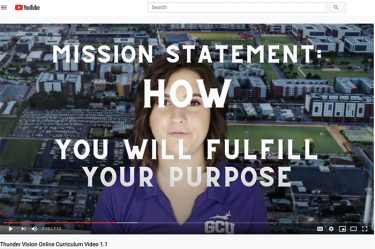
It’s an important aspect of Thunder Vision since many school children haven't stepped onto a college campus before.
Teacher Eric Alvarez of Glenn L. Downs Elementary School said the virtual version of Thunder Vision meant less distractions for students who, on past in-person tours, were easily distracted by the sights and sounds of campus life.
“I feel like there was a lot of focus and engagement,” he said of a recent Thunder Vision virtual field trip with his students. “The virtual field trip was incredible. I loved that it was interactive and incredibly informative.”
Students on the field trip also interact with GCU students on a Thunder Vision panel.
Huffman has worked with leaders in the College of Education, Canyon Christian Schools Consortium, women’s basketball, Students Inspiring Students and the Honors College to find GCU student volunteers to serve as Thunder Vision panelists.
“A HUGE variety of (GCU) students are coming and serving. They pop on the video in the last half-hour of the field trip, and (middle school) students can use Mentimeter to submit all of their questions,” said Huffman, the panel moderator. “I’ll take which questions we have next and leave it open-ended and allow the panelists to speak up to the questions they feel led to answer. It’s been awesome, honestly.”
Panelists not only have the chance to talk about their pathway to college and what college has been like for them as a GCU student, but they also are receiving credit for their service hours at a time when the pandemic is making it difficult for students to find volunteer opportunities. College of Education students are fulfilling some of their practicum hours, and Canyon Christian Schools Consortium and Students Inspiring Students recipients are completing volunteer hours required by the scholarships they receive.
Besides the field trip option, educators can choose the other virtual Thunder Vision model -- the online college-readiness curriculum – for their students.
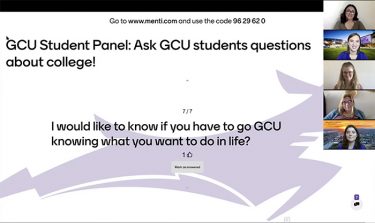
“I had been making YouTube videos for our department’s new YouTube Channel, where I had been doing fun professional-development tips for teachers," Huffman said. "So we thought, why not have me make some fun YouTube videos for the kids? I started a mini-series of my tips for being successful in high school. It was very YouTuber-style. It was really fun, so we decided, 'Let’s move with this further in a more permanent way.'”
Huffman partnered with several campus leaders to take the information she put together for those YouTube videos, plus the tips she has given at in-person events, to create the virtual Thunder Vision curriculum. The syllabus includes six topics featuring various lessons and activities. Huffman goes through those lessons in prerecorded videos.
Topic 1, for example, is “Find Your Purpose,” about creating a mission statement for one’s life and trying to find one’s passion.
Topic 4 covers GPA and SAT scores. “We loop in the Learning Lounge on that one, so we have a whole video on the Learning Lounge,” Huffman said. “We interviewed a couple of different Learning Lounge LEADs (learning advocates), and then one of the activities for that topic is to book a Learning Lounge session for extra credit.”
Another interesting collaboration is with the Academic and Career Excellence Centers, which made the University’s online career service tool, Career Compass, accessible to Thunder Vision participants.
One of the lessons in the virtual Thunder Vision curriculum focuses on careers. Students take a test on Career Compass, which makes career suggestions based on interests and strengths.
“They can create their resume – just various things like that – and look at the different majors they could go into at GCU, building out what education they need for the career they want,” Huffman said. “On Career Compass, they can research salaries. So we really use that as one of the main tools that the curriculum utilizes.”
She estimates that more than 270 Thunder Vision students have used Career Compass. Also, eight schools have attended 12 field trips so far with four more schools joining before Christmas, and 15 schools have participated in the Thunder Vision online curriculum.
K12 Educational Development is expecting to connect with even more educators and students as word gets out about the virtual version of Thunder Vision and continuing to help schools nurture that college culture.
“Even though our environment has been altered by COVID-19 and its related concerns,” Johnson said, “we still want students to aspire to a college degree and know that what they do in school now matters. Students will graduate and go on to college, despite the pandemic, and we know they will need support from a variety of resources to realize their full potential.”
GCU senior writer Lana Sweeten-Shults can be reached at [email protected] or at 602-639-7901.
***
Related content:
GCU Today: Students kick off college journey at Thunder Vision
GCU Today: GCU STEM camps balance youths’ summer equation
GCU Today: A lesson in teacher support – K12’s YouTube channel



































































